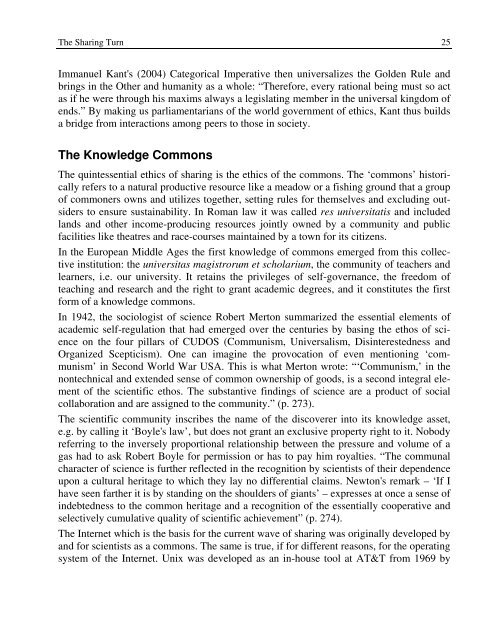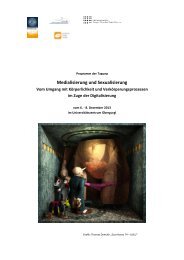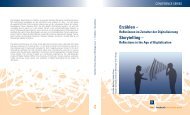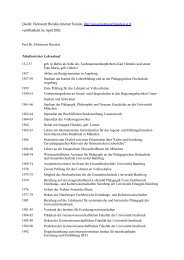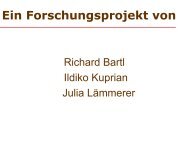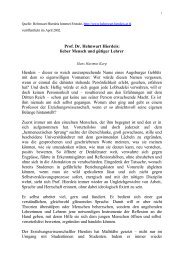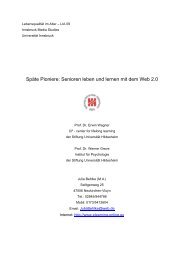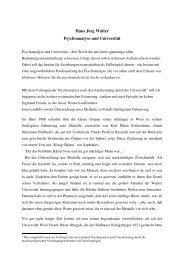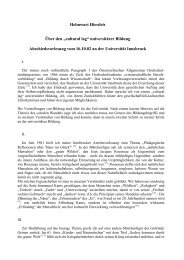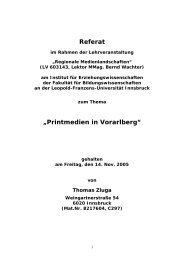Download pdf - Universität Innsbruck
Download pdf - Universität Innsbruck
Download pdf - Universität Innsbruck
Erfolgreiche ePaper selbst erstellen
Machen Sie aus Ihren PDF Publikationen ein blätterbares Flipbook mit unserer einzigartigen Google optimierten e-Paper Software.
The Sharing Turn 25<br />
Immanuel Kant's (2004) Categorical Imperative then universalizes the Golden Rule and<br />
brings in the Other and humanity as a whole: “Therefore, every rational being must so act<br />
as if he were through his maxims always a legislating member in the universal kingdom of<br />
ends.” By making us parliamentarians of the world government of ethics, Kant thus builds<br />
a bridge from interactions among peers to those in society.<br />
The Knowledge Commons<br />
The quintessential ethics of sharing is the ethics of the commons. The ‘commons’ historically<br />
refers to a natural productive resource like a meadow or a fishing ground that a group<br />
of commoners owns and utilizes together, setting rules for themselves and excluding outsiders<br />
to ensure sustainability. In Roman law it was called res universitatis and included<br />
lands and other income-producing resources jointly owned by a community and public<br />
facilities like theatres and race-courses maintained by a town for its citizens.<br />
In the European Middle Ages the first knowledge of commons emerged from this collective<br />
institution: the universitas magistrorum et scholarium, the community of teachers and<br />
learners, i.e. our university. It retains the privileges of self-governance, the freedom of<br />
teaching and research and the right to grant academic degrees, and it constitutes the first<br />
form of a knowledge commons.<br />
In 1942, the sociologist of science Robert Merton summarized the essential elements of<br />
academic self-regulation that had emerged over the centuries by basing the ethos of science<br />
on the four pillars of CUDOS (Communism, Universalism, Disinterestedness and<br />
Organized Scepticism). One can imagine the provocation of even mentioning ‘communism’<br />
in Second World War USA. This is what Merton wrote: “‘Communism,’ in the<br />
nontechnical and extended sense of common ownership of goods, is a second integral element<br />
of the scientific ethos. The substantive findings of science are a product of social<br />
collaboration and are assigned to the community.” (p. 273).<br />
The scientific community inscribes the name of the discoverer into its knowledge asset,<br />
e.g. by calling it ‘Boyle's law’, but does not grant an exclusive property right to it. Nobody<br />
referring to the inversely proportional relationship between the pressure and volume of a<br />
gas had to ask Robert Boyle for permission or has to pay him royalties. “The communal<br />
character of science is further reflected in the recognition by scientists of their dependence<br />
upon a cultural heritage to which they lay no differential claims. Newton's remark – ‘If I<br />
have seen farther it is by standing on the shoulders of giants’ – expresses at once a sense of<br />
indebtedness to the common heritage and a recognition of the essentially cooperative and<br />
selectively cumulative quality of scientific achievement” (p. 274).<br />
The Internet which is the basis for the current wave of sharing was originally developed by<br />
and for scientists as a commons. The same is true, if for different reasons, for the operating<br />
system of the Internet. Unix was developed as an in-house tool at AT&T from 1969 by


